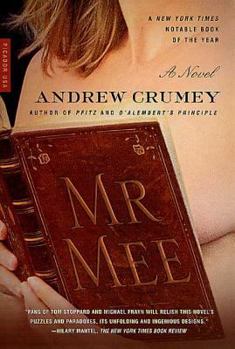Mr. Mee
Select Format
Select Condition 
Book Overview
'The playful preoccupation with alternative realities that dominated Scots author Crumey's previous fiction (including Pfitz and D'Alembert's Principle) also informs this richly amusing novel about... This description may be from another edition of this product.
Format:Paperback
Language:English
ISBN:0312282354
ISBN13:9780312282356
Release Date:March 2002
Publisher:St. Martins Press-3PL
Length:352 Pages
Weight:0.75 lbs.
Dimensions:0.9" x 6.0" x 8.2"
Customer Reviews
4 ratings
An interesting little book
Published by Thriftbooks.com User , 19 years ago
Mr. Crumey has brought together so many ideas and themes that it makes my head spin trying to keep up. At the end of the day, what I felt was sad....so sad that after all the great ideas and stories, we came down to the old fella sitting in the room with the sad girl. If you end up reading the book, I would wish you the same feeling - there is a bit more to wrap up the plot line, but... overall, I think Mr. Crumey thinks us a sad lot.... either that or he has been reading to much Moliere :)) Worth a look at, but be warned, there is some graphical descriptions... my fourteen year old is going to have to wait a while... Interesting thing about this book is that I am not sure what to do with it now. One would have to be pretty "into" philosophy and some of the old writers to even have a chance of keeping up with the flow. Rousseau and internet pornography....Most folks that find one interesting, won't have a thing to do with the other! interesting match (thus the wildly divergent reviews)!! All the best, Jay
Internet Porn and Enightenment Philosophers
Published by Thriftbooks.com User , 23 years ago
Mr. Mee is very much a novel of ideas, and much of the ?action? of the novel comes in the form of Crumey?s playful tweaking of intellectual and literary history and his insistent investigation into philosophical questions of reality, fantasy, and imagination. Through a prolonged examination of the legacies of Rousseau, Proust, and?to a lesser extent?Flaubert, Crumey creates a novel in which fact is inextricably conjoined with fiction, and the line between reality and fantasy becomes very problematic indeed.The novel is distinguished by a complex intertextuality in which three separate narratives weave in and out of each other, connecting, confirming, contradicting. The first is the epistolary record of Mr. Mee, an elderly antiquarian in search of the elusive and possibly apocryphal Rosier?s Encyclopedia. The second (and finest) of the three narratives chronicles the adventures of Ferrand and Minard, two bumbling characters who are forced to flee Paris after a commission to copy the Encyclopedia involves them in murder and conspiracy. The third concerns a literature professor's preoccupations with issues of memory and imagination as he contemplates seducing one of his students.Although there are some distracting philosophical asides and some forced humor, Crumey manages to create a playfully inventive fiction that examines the intellectual legacy of the Enlightenment in light of information theory and quantum mechanics. If that sounds interesting to you, by all means proceed. If not, you'll be better off looking elsewhere.
Apparently not for everyone
Published by Thriftbooks.com User , 24 years ago
I just finished this book, and was curious how it was reviewed by others. I don't think I've ever seen a book with so wild a divergence of opinion, (1 star, 3 stars and 5 stars).I thought the book was clever and fun. Mr. Crumey had me laughing out loud many times at the inventive activity of the fairly well developed characters. I look forward to checking out his other offerings
Another wonderful playful novel from Crumey
Published by Thriftbooks.com User , 24 years ago
This novel deals with big questions. What exactly is the link between Rousseau, the internet, and Jimmy Shand (a well known Scottish accordion player)? And is fire a lifeform?Andrew Crumey is one of a new type of British writers, more interested in a tradition exemplified by Borges, Calvino, Barthelme, and Kundera, than another suburban study of the humdrum lives of humdrum people. (Dan Rhodes is another writing in this way) In reviews elsewhere on these pages I have made reference to his place within this seam of writing, the novel of ideas.Crumey is an exemplary model in this regard. His previous novels include Music in a foreign language (a Calvinoesque look at fiction and love); Pfitz; and D'Alembert's Principle (the latter two books in a loosely related triptych on memory, reason, and imagination concluded by this novel). In this novel there are echoes of these earlier works throughout, and their themes, and some of the characters and ideas, permeate this new novel. And like those previous works this novel is a Chinese box. This time there are three interlinking narratives - Mr Mee's own introduction to the internet and Rosier's Encyclopaedia; the story of two copyists that disturb Jean Jacques Rousseau's peaceful retreat (Ferrand and Minard, two characters referred to fleetingly in Rousseau's Confessions, that have something of man of Porlock of them); and the confession of an academic studying eighteenth century French fiction. The strands come together wonderfully.Crumey's fiction taps the rich source of eighteenth century French philosophical thinking (as well as modern variants). However, to refer to this gives a misleading impression of the novel. His work is clever, but his intellect is worn lightly. The novels set you thinking. But, most importantly, Andrew Crumey is very funny. Like his previous novels this is witty and charming. Andrew Crumey gets better and better. I very much look forward to his next work.






